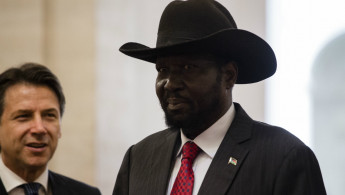South Sudan paying US lobbyists $3.7m for better Trump ties
The $3.7 million two-year contract between South Sudan's government and Gainful Solutions, a lobbying firm run by former US Ambassador Michael Ranneberger, was signed earlier this month.
Gainful Solutions was hired to try to "delay and ultimately block [the] establishment of the hybrid court", among other goals, the document, seen by AP, states.
It also aims to open a "channel of communication" between US President Donald Trump and South Sudanese President Silva Kiir.
Such a channel would be used to persuade the Trump administration to extend economic and political ties, and support US investment in oil, energy, gas, mining and natural resources.
The firm will also be tasked with pushing the Trump administration to enter into a military relationship with South Sudan to "fight extremism" and "promote regional stability".
The long-delayed hybrid court is a key element of a fragile peace deal signed in September. In theory, the court would hold accountable those responsible for war crimes in the conflict that has killed nearly 400,000 people.
It should have been established and operational within a year of an August 2015 peace deal, but South Sudan's government stalled in signing the memorandum of understanding with the African Union and passing legislation to establish the court.
The lobbying contract deepens observers' worries that last year's peace deal, already marked by delays and fighting, will fall apart, and with it any hopes for justice.
Kiir’s government has repeatedly said it lack sufficient funds to implement the deal's $285 million initial phase.
The deal's next major deadline - for opposition leader Riek Machar to return to South Sudan by May 12 to again become Kiir's deputy in a unity government - is just weeks away, with the opposition seeking a six-month extension over security concerns.
South Sudan's opposition has hit back at the lobbying contract.
"It only shows the desperation the government is in, trying to evade accountability and justice ... misplaced priorities," Henry Odwar, opposition deputy chairman, told the AP.
South Sudan's deputy chief of mission in the United States, Gordon Buay, claimed the country had no intention to abolish the hybrid court, but instead believed that the priority needed to be on reconciliation rather than punitive justice.
"The West wants it right away ... but we can't do them concurrently," Buay told AP.
"It will be a lot easier to hold leaders to account if the community is on board and that first requires reconciliation."
But many South Sudanese are longing for justice after a grueling civil war.
The civil war began in December 2013 when Kiir accused Machar - then his deputy - of plotting a coup.
The conflict was split along ethnic lines, seeing mass rape, the forced recruitment of child soldiers and attacks on civilians. It has caused one of the world's worst humanitarian crises.
The contract raises questions about the South Sudanese government's commitment to justice for the "countless victims who have been executed, disappeared and raped by government and opposition forces," said Sarah Jackson, regional deputy director for Amnesty International.
The contract indicates that the government "doesn't want the peace deal to be implemented", claimed Klem Ryan, former coordinator of the UN panel of experts monitoring sanctions on South Sudan.
"Taking money to lobby against accountability and for impunity is disgraceful."
Follow us on Twitter: @The_NewArab





 Follow the Middle East's top stories in English at The New Arab on Google News
Follow the Middle East's top stories in English at The New Arab on Google News


